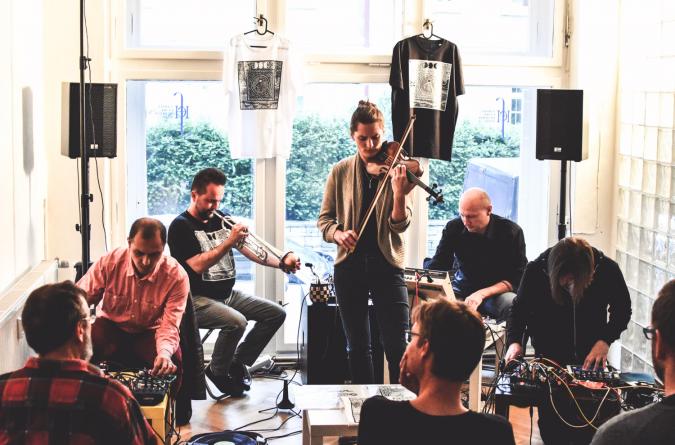nmz: IAMIC, the International Association of Music Information Centres, unites 33 music information centres worldwide. What are the tasks of a music information centre?
MARSH: IAMIC has members all over the world—many are from Europe, but we also have members from countries such as Australia, the US, Canada, and New Zealand (the country I represent). The core tasks of most music information centres include documenting, archiving and providing information about the music and musical life of their respective country or region, incorporating a variety of musical genres. The production of music and the advocacy and training of artists also play an important role for many of our partners. However, despite all the similarities, our activities also differ from each other. Some members represent their country in the international market, so they devote more attention to music export issues.
nmz: What is the function of IAMIC and why is international exchange so important for the centres?
MARSH: IAMIC is a network representing countries from around the globe. We facilitate networking between our members to promote and increase the appreciation for and understanding of music worldwide. IAMIC, through its collective network, facilitates the exchange of knowledge and expertise to ensure greater international cooperation. We exchange information about the music and musical life of our regions and nations, share information about our activities, and the ambitions we have to improve standards and access to music worldwide.
nmz: How long has IAMIC existed, and how long have music information centres existed?
MARSH: Music information centres have a long tradition in many countries. New Music USA (formerly the American Music Centre) was founded as early as 1939, and after the Second World War the Netherlands and Canada joined in. Then in 1959 an international association, now IAMIC, was founded under the patronage of the International Music Council. In 1962 it became a constituent branch of the International Association of Music Information Libraries, Archives and Documentation Centres (IAML). In the early 1990s, however, the association with IAML ended and IAMIC became an independent organisation. After many more music information centres had been established in countries such as Austria, Germany, Iceland, Bulgaria, Georgia and New Zealand in the 1990s, IAMIC was finally recognised as a legal entity under Belgian law in 2009.
nmz: So the German Music Information Centre (miz) was one of the last centres to be founded? Why did this happen so late in a country so rich in musical tradition?
SCHULMEISTRAT: It is true that the miz was opened relatively late, in 1998. However, demands for a documentation centre for musical life had existed since the 1970s - with many different concepts. In 1986, the Music Almanac, issued by the German Music Council, was published for the first time as a reference work on musical life, but at that time there was still no central information centre to collect and systematically record data and facts. The Almanac was ultimately the nucleus for today's miz with its diverse offerings. Another factor was certainly that many of the tasks performed by music information centres in other countries were traditionally covered by different organisations in Germany. The German Music Archive, for example, collects sheet music and sound carriers centrally, and contemporary music has always had a vivid scene with various institutions. That's why the miz still sees itself as a kind of network in which information on central topics of musical life converges. We check, process and communicate the data. This was the concept realised by the German Music Council and politics at the end of the 1990s.
nmz: How do the tasks of the miz differ from those of other centres?
SCHULMEISTRAT: The miz is an interface, a course book on musical life. We offer an overall view of almost all topics and genres. Whether it's statistical questions, for example, how many people make music in their free time? How high is the proportion of women in leadership positions in publicly financed orchestras? Or what revenue is achieved by the individual sectors of the music economy? Or about structures of musical life: via our website www.miz.org, we systematically present more than 10,000 institutions, we provide information about developments, trends and backgrounds in articles, we document current cultural policy discussions, we bundle further education and training offerings throughout Germany. The miz thus has a very broad portfolio and sees itself as a contact for cultural policy and associations, the media and academia, as well as music professionals and amateurs.
nmz: Who finances the music information centres? Are they exclusively publicly funded institutions?
MARSH: The funding of the music information centres varies greatly from country to country. However, many are funded through government agencies and specialist organisations. But we all agree that, especially in these times, sustainable sources of funding are needed to ensure the success and viability of our organisations. I would even say, given the challenges of our times, that music information centres are more important today than ever. Nevertheless, many of our colleagues are currently facing financial challenges. Therefore, we continue to encourage advocacy to create and develop cultural policies that strengthen our collective work in the long term.
nmz: In May, representatives of the music information centres will be waiting for you in Bonn for the annual conference of IAMIC. What expectations do you have for the conference after the long break due to the pandemic?
SCHULMEISTRAT: First of all, we are very happy that the conference can finally take place. Actually, it was initially planned for the Beethoven Year 2020, but then we had to postpone it twice because of the coronavirus. We are looking forward to the international exchange with great excitement, because since the beginning of the pandemic, musical life has been facing great challenges internationally and there is a strong pressure to innovate overall. The Covid-19 pandemic, which has accelerated many issues as if under a burning glass, will be an important topic for us. How did the other countries deal with it? How did they counteract it? What perspectives do they see?
nmz: There will also be a public session. What topics will be dealt with there?
SCHULMEISTRAT: IAMIC traditionally opens one day of its otherwise closed conference. We have given this day an overarching motto: “Musical life between tradition and the future”. The world of music has been experiencing greater changes than ever since the last few decades, and we will be talking about this in four panels. We want to look at how internationalisation and globalisation affect different areas of musical life. The focus will lie on the topics of contemporary music and copyright as well as questions of programme planning, the funding of young musicians and music education. As a common thread, the aspects of digitalisation, climate protection and diversity will be highlighted as well as the question of what lessons can be learned from the Covid-19 pandemic.
We have succeeded in attracting more than 20 high-calibre experts with whom we will discuss. Anyone interested in attending can dial into the conference online on 24 May. The entire day will be streamed for a worldwide audience.
nmz: What do you expect from the international exchange with representatives of German musical life?
MARSH: The value of IAMIC lies in creating connections between its members and their respective musical ecosystems. So we are very much looking forward to connecting with our colleagues from Germany, especially given the challenges we have all faced over the last two years. As Stephan said, there has never been a time in recent history when we have all faced the same challenges to the extent that we have with the global pandemic, the #blacklivesmatters and #metoo movements, the climate crisis and of course the recent Russian invasion of Ukraine. All these issues have an impact on musical life and our work, and this emphasises how important international exchange and cooperation is.
In addition, through the varied conference programme we will gain a German perspective on these issues. The topics are of importance to us all and I am sure this will lead to some stimulating discussions and insights that we can take back to our respective countries.
nmz: There will also be a special IAMIC concert. What is the focus there?
SCHULMEISTRAT: It is a tradition of the IAMIC conferences that the host institution portrays the contemporary music of its country in a concert. In cooperation with our colleagues from the Podium Gegenwart in the German Music Council, we have engaged two outstanding young ensembles from the “InSzene” programme, each of which will perform one half of the concert:
Trio Abstrakt and The Interstring Project. This will certainly be an exciting evening for our guests, also because the concert will take place in the museum complex Bahnhof Rolandseck designed by star architect Richard Meier. In part, the ensembles will make musical use of the space.
nmz: The miz has just relaunched its website on musical life in Germany. How do you assess the structures and developments of musical life in Germany from an international perspective?
MARSH: Germany has a rich cultural heritage and a very lively and diverse musical life. The new website of the miz is impressive and underlines the important role Germany plays in music worldwide. It sets a high standard for what can be achieved in music.
However, the facts and figures presented by the miz show that creatives and freelancers in Germany often cannot make a living from what they earn with music – and this is also the case in many other countries. This makes it clear once again that we still have a long way to go to ensure that musical creativity is valued and fairly remunerated in our societies.
This interview was conducted by Andreas Kolb. Reprinted with kind permission of the neue musikzeitung.



